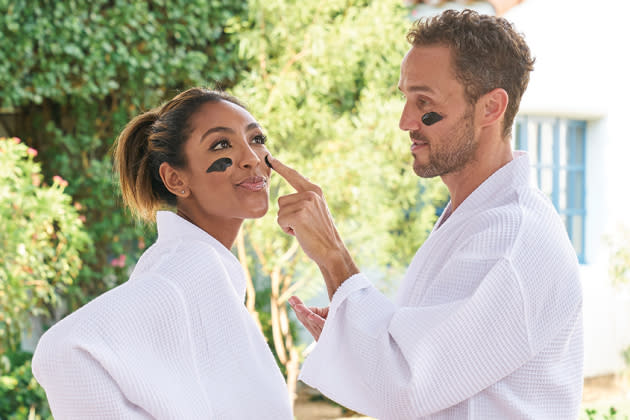10 Years Ago, ‘The Bachelorette’ Star Zac Clark Was in Rehab. Today, He’s Helping Millions Through Sobriety & Recovery

In 2011, Zac Clark went missing.
The New Jersey native, known for his recent appearance on “The Bachelorette,” left home without saying a word, prompting his family to begin a search. He finally turned up at a bank, trying to cash a forged check stolen from his father. He was desperate for money to get high.
More from Variety
How 'Jerry Maguire' Legend Leigh Steinberg Rebuilt His Sports Agency After Getting Sober
The Osbournes Open Up About Addiction and How the Family Finally Found Recovery
Years before, after suffering a brain tumor, Clark had become addicted to pain pills and was abusing alcohol. When he tried to cash the check, the bank teller knew something was wrong. But instead of calling the police, she called Clark’s father, who rushed to the bank before his son could disappear back onto the streets. Two days later, after hitting what Clark describes as rock bottom, he was in treatment.
Fast-forward 10 years and Clark, who turned 37 the week of this interview, is one of the most notable reality stars to address his sobriety on television as the most recent winner of ABC’s “The Bachelorette.” He became engaged to “Bachelorette” Tayshia Adams in December on the 16th season of the dating show.
Ever since he got clean, he has dedicated his life to helping others. In 2017, he co-founded the Release Recovery center, a full-service organization in New York that has more than 40 employees, and that recently launched a nonprofit foundation to help individuals struggling with addiction in underserved communities. He also sits on the board of the rehab center where he was a patient less than a decade ago.
“In addition to meeting Tayshia, the biggest gift coming out of this is we’ve already been able to help a lot of people that we wouldn’t have been able to otherwise,” Clark says, sharing that his DMs are overflowing every day with messages from people caught in the trap of substance abuse or from family members seeking care for their loved ones. “In some weird way, if me writing back gives someone more hope just by me weirdly being on television, I’ll do that all day.”
On the show, Clark revealed his story to Adams during their one-on-one date. The scene stood out as one of the most significant moments ever to air in the nearly 20-year history of “The Bachelor” franchise. His storyline was a curveball for the dating series, which only recently started showcasing weighty conversations, including discussions with other contestants about race and mental health.
“The producers do an amazing job at evolving ‘The Bachelor’ franchise to stay in step with the world around us from season to season,” says Brooke Karzen, executive vice president & head of Warner Horizon Unscripted Television. “We are inspired by the way the show resonates with individuals and their personal battles to deliver such a powerful narrative.”
On-screen, Adams started to fall in love with Clark over his vulnerability in revealing his true self. Today, he praises her curiosity and willingness to learn about his journey. “One of the things that impressed me was her ability to take this on and ask a lot of questions,” Clark says, recalling his time filming the show with his now-fiancée. “She even asked if she could kiss me if she had a glass of wine.”
From “Jersey Shore” to “The Real Housewives,” reality TV has had a long reputation for glamorizing drama, often fueled by alcohol — which in turn drives ratings. When the current reality TV wave began in the early 2000s, the recipe for success was essentially to put a camera on a larger-than-life personality and let chaos ensue.
On the “Bachelor” franchise, production formalized on-set rules surrounding alcohol in 2017, after a highly publicized incident on “Bachelor in Paradise” between contestants Corinne Olympios and DeMario Jackson led to a production shutdown and to Warner Bros. launching an investigation. Nowadays, contestants are limited to two alcoholic drinks per hour, which are poured by production staffers — in other words, alcohol is available but not free-flowing. And if a cast member does not want to drink, they are in no way encouraged to consume alcohol, according to sources close to production.
For Clark, he explains that production took great lengths to make sure he never felt singled out for his sobriety, pouring apple cider in his glass during Champagne toasts and making sure he always had a nonalcoholic beverage to hold during cocktail parties. “They deserve props for their awareness, and also probably learning more about this,” Clark says about the producers and crew.
Clark believes television can be a powerful medium for shining a positive light on recovery and addiction. With his increased platform, in addition to helping others get treatment, he hopes to change the perception surrounding substance abuse.
“The more we can make recovery look good and normalize this thing and not even use words like ‘stigma,’ the better,” he says. “If someone had cancer, you’re not going to treat them differently, so if someone is sober, I challenge others to treat them like you would anyone else who had any other illness.”
Best of Variety
Sign up for Variety’s Newsletter. For the latest news, follow us on Facebook, Twitter, and Instagram.